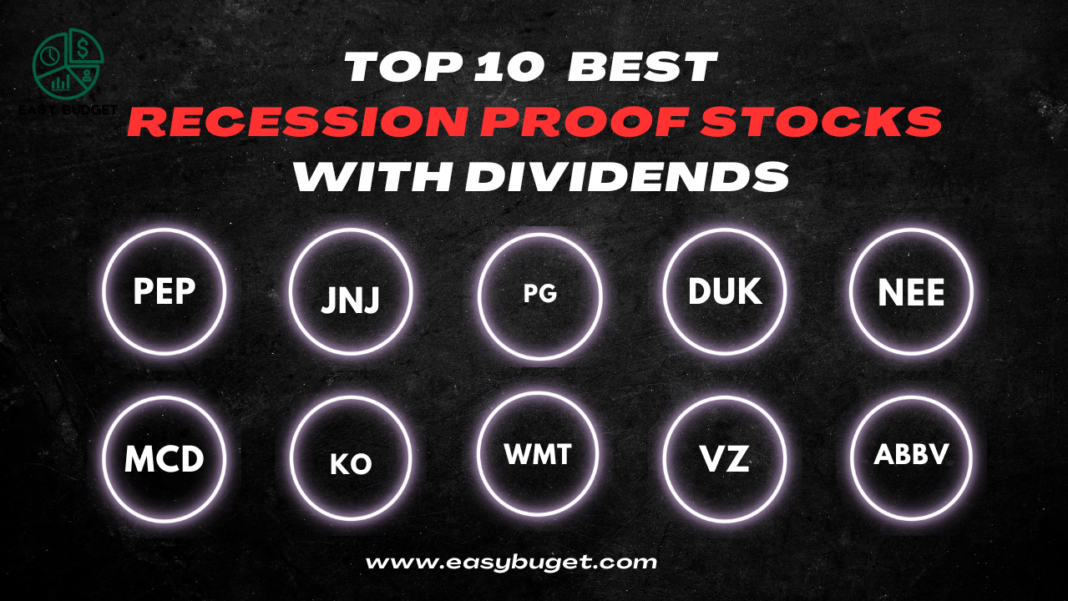Introduction
Did you know that dividend-paying stocks outperformed the S&P 500 during the last three recessions? While the stock market can feel like a rollercoaster during economic downturns, recession proof dividend stocks offer a smoother ride. These stocks provide steady income, lower volatility, and long-term growth potential—making them a must-have for any investor’s portfolio.
In this guide, we’ll break down everything you need to know about recession-proof dividend stocks, including:
- What makes a stock recession-proof.
- The best sectors and stocks to focus on.
- How to build a portfolio that thrives in any economy.
Let’s dive in!
What Are Recession Proof Dividend Stocks?
Recession proof dividend stocks are shares of companies that continue to perform well—and pay consistent dividends—even during economic downturns. These companies typically have:
- Strong cash flow: They generate enough revenue to cover expenses and pay dividends.
- Essential products/services: Think groceries, healthcare, and utilities—things people can’t live without.
- Low debt and robust balance sheets: They’re financially stable, even when times are tough.
Example: Procter & Gamble (PG) sells everyday essentials like toothpaste and laundry detergent. Even in a recession, people still need these products, making PG a reliable dividend stock.
Why To Invest in Recession Proof Dividend Stocks?
Here’s why these stocks belong in your portfolio:
- Steady Income: Dividends provide cash flow, even when stock prices fall.
- Lower Volatility: Defensive stocks tend to be less volatile during market crashes.
- Long-Term Growth: Many dividend stocks have a history of increasing payouts over time.
Fun Fact: According to Hartford Funds, dividends have contributed nearly 40% of the S&P 500’s total return since 1930.
Key Sectors for Recession Proof Dividend Stocks
Not all sectors are created equal. Here are the top industries to focus on:
1. Consumer Staples
- Examples: Procter & Gamble (PG), Coca-Cola (KO).
- Why: People still buy essentials like food and household items during recessions.
2. Healthcare
- Examples: Johnson & Johnson (JNJ), Pfizer (PFE).
- Why: Healthcare demand remains stable regardless of the economy.
3. Utilities
- Examples: Duke Energy (DUK), NextEra Energy (NEE).
- Why: Utilities are essential services with regulated, predictable cash flows.
4. Telecommunications
- Examples: Verizon (VZ), AT&T (T).
- Why: Communication services are non-discretionary.
5. Real Estate (REITs)
- Examples: Realty Income (O), Simon Property Group (SPG).
- Why: REITs with long-term leases provide steady income.
Top 10 Recession-Proof Dividend Stocks for 2025
Here are our top picks for building a resilient portfolio:
- Procter & Gamble (PG): Consumer staples giant with 65+ years of dividend growth.
- Johnson & Johnson (JNJ): Healthcare leader with a diversified product portfolio.
- Coca-Cola (KO): Global beverage company with strong brand loyalty.
- Verizon (VZ): Telecom leader with a high dividend yield.
- Duke Energy (DUK): Utility company with stable cash flows.
- Realty Income (O): REIT known as “The Monthly Dividend Company.”
- PepsiCo (PEP): Snack and beverage leader with consistent dividend growth.
- AbbVie (ABBV): Pharmaceutical company with a high dividend yield.
- NextEra Energy (NEE): Renewable energy utility with strong growth potential.
- Walmart (WMT): Discount retailer that thrives during economic downturns.
Metrics to Evaluate Recession Proof Dividend Stocks
Before investing, check these key metrics:
- Dividend Yield: Annual dividend payment as a percentage of the stock price.
- Payout Ratio: Percentage of earnings paid as dividends (ideal: <60%).
- Dividend Growth History: Look for companies with 10+ years of consecutive dividend increases.
- Debt-to-Equity Ratio: Lower ratios indicate stronger balance sheets.
- Free Cash Flow: Ensures the company can sustain and grow dividends.
Pro Tip: Use tools like Morningstar to analyze these metrics.
Strategies for Building a Recession Proof Dividend Portfolio
- Diversify Across Sectors: Avoid overexposure to any single industry.
- Focus on Quality: Prioritize companies with strong fundamentals and competitive advantages.
- Reinvest Dividends: Use dividend reinvestment plans (DRIPs) to compound returns.
- Dollar-Cost Averaging: Invest consistently to reduce the impact of market volatility.
- Monitor Performance: Regularly review your portfolio and rebalance as needed.
Risks of Investing in Recession Proof Dividend Stocks
Even the safest stocks come with risks:
- Interest Rate Sensitivity: Rising rates can pressure high-yield stocks.
- Sector-Specific Risks: Regulatory changes or technological disruptions.
- Dividend Cuts: Even “safe” stocks can reduce payouts during severe downturns.
- Valuation Risks: Overpaying for stocks can reduce long-term returns.
International Recession Proof Dividend Stocks
What Are They?
International recession proof dividend stocks are shares of companies based outside your home country that have a history of paying consistent dividends and performing well during economic downturns. These companies often operate in essential industries, just like their domestic counterparts, but they add an extra layer of diversification to your portfolio.
Examples:
- Nestlé (NSRGY): A Swiss multinational food and beverage company. Nestlé sells everyday essentials like coffee, bottled water, and pet food, making it a reliable choice during recessions.
- Unilever (UL): A British-Dutch company that produces household staples like soap, shampoo, and cleaning products.
Why To Invest in International Dividend Stocks?
- Geographic Diversification: By investing in companies across different regions, you reduce the risk of being overly exposed to a single country’s economic conditions.
- Currency Hedge: Holding international stocks can protect your portfolio from currency fluctuations.
- Growth Opportunities: Many international markets (e.g., emerging economies) offer higher growth potential than mature markets like the U.S.
Pro Tip: Use platforms like Interactive Brokers or eToro to access international stocks easily.
Dividend ETFs for Recession Protection
What Are They?
Dividend ETFs (Exchange-Traded Funds) are investment funds that track a basket of dividend-paying stocks. They offer instant diversification, making them a great option for investors who want exposure to multiple recession-proof stocks without picking individual companies.
Examples:
- Vanguard Dividend Appreciation ETF (VIG): Tracks companies with a history of increasing dividends over time. Top holdings include Johnson & Johnson (JNJ) and Microsoft (MSFT).
- iShares Select Dividend ETF (DVY): Focuses on high-dividend-paying U.S. companies, such as Chevron (CVX) and Philip Morris (PM).
Why To Invest in Dividend ETFs?
- Diversification: ETFs spread your investment across dozens (or hundreds) of stocks, reducing the risk of any single company underperforming.
- Low Cost: ETFs typically have lower fees compared to mutual funds.
- Ease of Access: You can buy and sell ETFs like stocks, making them a flexible option for investors.
Resource: Check out Morningstar’s ETF screener to compare dividend ETFs.
Tax Implications of Dividend Investing
Qualified vs Non-Qualified Dividends
- Qualified Dividends: These are taxed at the lower long-term capital gains tax rate (0%, 15%, or 20%, depending on your income). To qualify, the stock must be held for more than 60 days during the 121-day period surrounding the ex-dividend date.
- Non-Qualified Dividends: These are taxed as ordinary income, which can be as high as 37% for top earners.
Strategies to Minimize Taxes
- Hold Dividend Stocks in Tax-Advantaged Accounts:
- Use IRAs or 401(k)s to defer or avoid taxes on dividends.
- Focus on Qualified Dividends:
- Invest in companies that pay qualified dividends to benefit from lower tax rates.
- Tax-Loss Harvesting:
- Offset dividend income with capital losses from underperforming investments.
Example: If you’re in the 22% tax bracket, qualified dividends are taxed at 15%, while non-qualified dividends are taxed at 22%.
Behavioral Finance Tips
Stay Disciplined
- Avoid Panic Selling: During market downturns, it’s tempting to sell your stocks to avoid further losses. However, recession-proof dividend stocks are designed to weather economic storms. Selling during a downturn locks in losses and prevents you from benefiting from the eventual recovery.
- Stick to Your Plan: Create a long-term investment strategy and stick to it, regardless of short-term market fluctuations.
Focus on the Long Term
- Recession Proof Stocks Are for Stability: These stocks are not designed for quick gains but for steady income and long-term growth.
- Reinvest Dividends: Use dividend reinvestment plans (DRIPs) to compound your returns over time.
Example: During the 2008 financial crisis, many dividend-paying stocks like Procter & Gamble (PG) and Johnson & Johnson (JNJ) not only maintained their dividends but also recovered their stock prices within a few years.
FAQs About Recession Proof Dividend Stocks
1. What is Recession-Proofing?
Recession-proofing is the process of preparing your finances, investments, and lifestyle to withstand an economic downturn. It involves:
- Building an Emergency Fund: Save 3-6 months’ worth of living expenses to cover unexpected costs.
- Reducing Debt: Pay off high-interest debt to free up cash flow.
- Investing in Recession-Resistant Assets: Focus on stocks, sectors, or funds that perform well during downturns (e.g., consumer staples, utilities).
- Diversifying Income Streams: Create multiple sources of income, such as side hustles or passive investments.
Example: During the 2008 recession, people with diversified portfolios and emergency savings were better equipped to handle job losses or market crashes.
2. What is the Best Thing to Buy in a Recession?
The best things to buy during a recession fall into two categories: essentials and bargains.
Essentials:
- Groceries and Household Supplies: Stock up on non-perishable items like canned goods, cleaning supplies, and toiletries.
- Healthcare Products: Medications, first-aid kits, and vitamins are always in demand.
- Utilities and Services: Invest in energy-efficient appliances or home repairs to reduce long-term costs.
Bargains:
- Stocks: High-quality companies often see their stock prices drop during recessions, creating buying opportunities. Examples include blue-chip stocks like Coca-Cola (KO) or Johnson & Johnson (JNJ).
- Real Estate: Property prices may decline, making it a good time to buy a home or invest in rental properties.
- Discounted Goods: Retailers often slash prices on electronics, furniture, and clothing to boost sales.
Pro Tip: Use tools like CamelCamelCamel to track price drops on Amazon and snag deals.
3. What is the Best Investment During a Recession?
The best investments during a recession are those that provide stability, income, and long-term growth potential. Here are the top options:
1. Dividend Stocks:
- Why: Companies with strong cash flows and a history of paying dividends (e.g., Procter & Gamble, Verizon) tend to perform well during downturns.
- Example: Dividend aristocrats like Johnson & Johnson (JNJ) have increased payouts for 50+ years.
2. Consumer Staples:
- Why: People still buy essentials like food, toiletries, and cleaning supplies, even in a recession.
- Example: Walmart (WMT) and Coca-Cola (KO) are recession-resistant stocks.
3. Utilities:
- Why: Utilities provide essential services (electricity, water) and have stable cash flows.
- Example: Duke Energy (DUK) and NextEra Energy (NEE) are reliable picks.
4. Bonds and Bond ETFs:
- Why: Bonds are less volatile than stocks and provide steady income.
- Example: Vanguard Total Bond Market ETF (BND) offers broad exposure to the bond market.
5. Gold and Precious Metals:
- Why: Gold is a safe-haven asset that often rises in value during economic uncertainty.
- Example: SPDR Gold Shares (GLD) is a popular gold ETF.
Resource: Use Morningstar to research and compare investment options.
4. How to Profit in a Recession?
Profiting in a recession requires a mix of strategic investing, frugal living, and opportunistic actions. Here’s how:
1. Invest in Discounted Assets:
- Stocks: Buy high-quality companies at lower prices. For example, during the 2020 recession, Amazon (AMZN) and Apple (AAPL) saw temporary dips before rebounding strongly.
- Real Estate: Look for foreclosures or distressed properties.
2. Start a Side Hustle:
- Freelancing: Offer skills like writing, design, or coding on platforms like Upwork.
- E-Commerce: Sell products online via Etsy or Shopify.
3. Save and Cut Costs:
- Trim Expenses: Cancel unused subscriptions, cook at home, and shop sales.
- Build an Emergency Fund: Save aggressively to take advantage of opportunities.
4. Invest in Yourself:
- Learn New Skills: Use free or low-cost resources like Coursera or Udemy to boost your employability.
- Network: Build relationships that could lead to job opportunities or collaborations.
5. Take Advantage of Government Programs:
- Stimulus Checks: Use extra funds to pay down debt or invest.
- Low-Interest Loans: Some governments offer loans or grants to small businesses during recessions.
Example: During the 2008 recession, savvy investors bought stocks like Amazon (AMZN) and Netflix (NFLX) at discounted prices, earning massive returns as the economy recovered.
Conclusion
Recession-proof dividend stocks are a powerful tool for building wealth and weathering economic storms. By focusing on quality companies, diversifying across sectors, and reinvesting dividends, you can create a portfolio that provides steady income and long-term growth—no matter what the economy throws your way.
Ready to get started? Research top picks like Procter & Gamble (PG) and Johnson & Johnson (JNJ), and begin building your recession-proof portfolio today.
For more tips on dividend investing, check out our guide: How to Build Wealth with Dividend Stocks.
Please subscribe Easy Budget to stay updated about our latest blogs!














